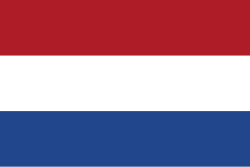| Netherlands at the 1968 Winter Olympics | |
|---|---|
 | |
| IOC code | NED (HOL used at these Games) |
| NOC | Dutch Olympic Committee |
| in Grenoble | |
| Competitors | 9 (4 men, 5 women) in 1 sport |
| Flag bearer | Stien Baas-Kaiser (speedskating) |
| Medals |
|
| Winter Olympics appearances (overview) | |
Athletes from the Netherlands competed at the 1968 Winter Olympics in Grenoble, France.

